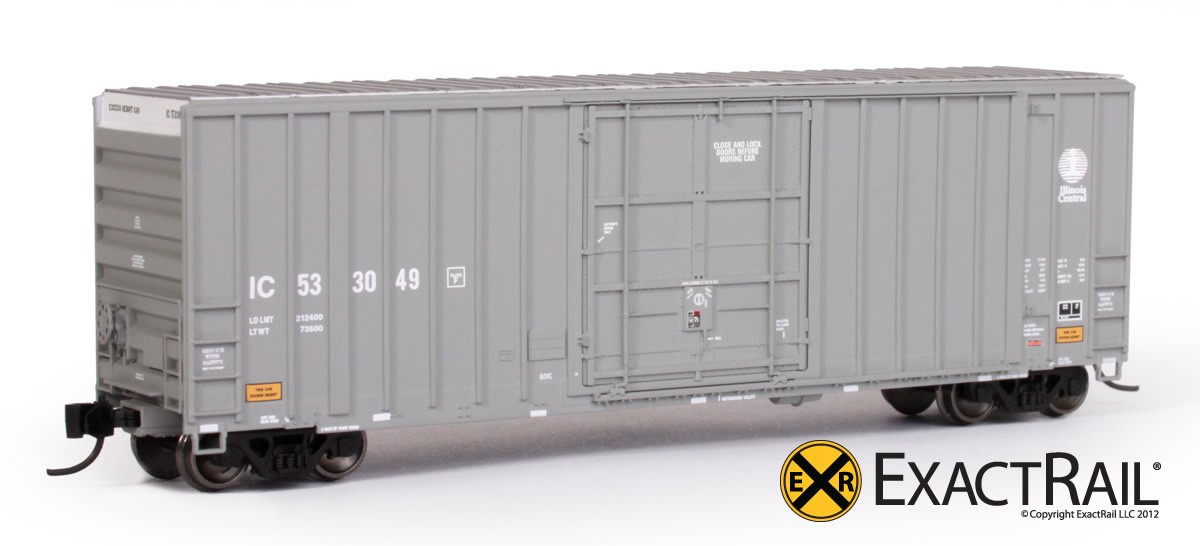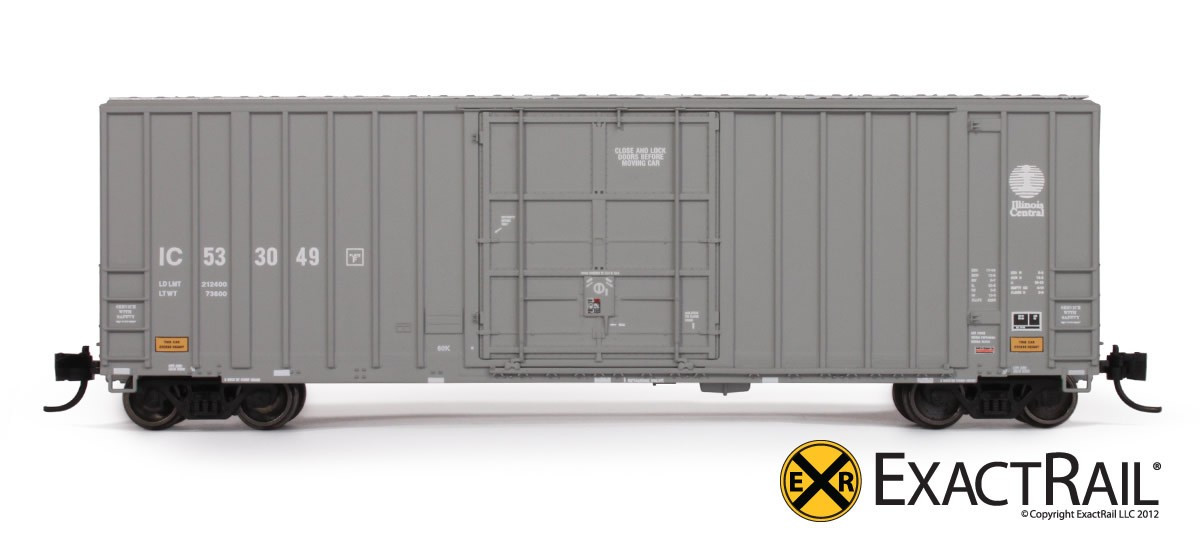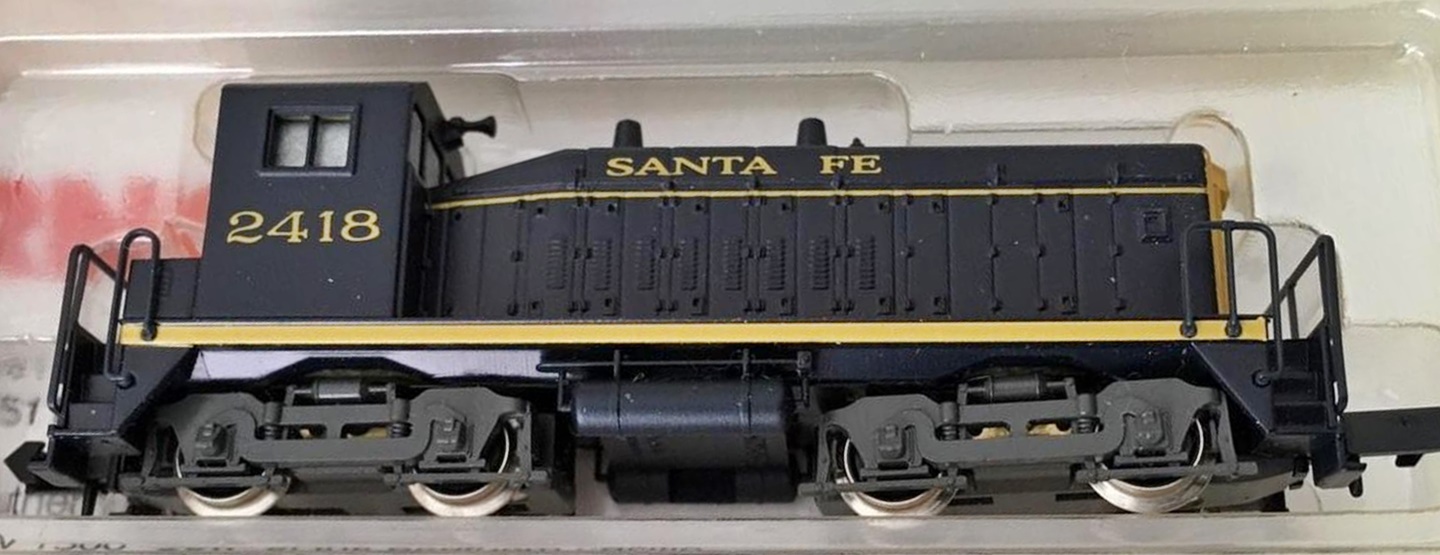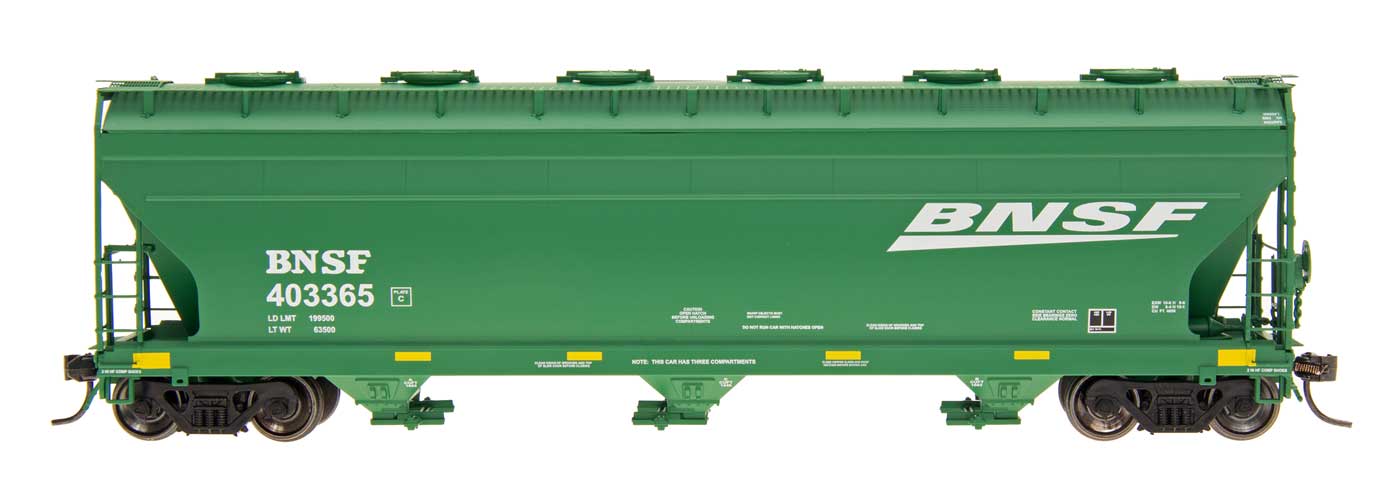Model Information: Designed, engineered, and tooled in the United States, these models have factory installed Micro-Trains Line stock number 1015 couplers, narrow-style, body mounted draft gear boxes, with shank wedges, striker casting and full nut and bolt detail, ExactRail's own ASF 100 Ton Ride Control trucks, CNC machined 36" metal wheel-sets with steel axles, accurate lettering styles and logotypes, razor sharp printing, and true to life paint colors.
Like many of ExactRail's models, these are nicely made, basic rolling stock models. They have nice molded detail and printing so they look good. They also model a specific modern prototype and model it well. Instead of just stating '50 Foot Plug Door Boxcar', these models target very specifically the Gunderson 6269 Hy-Cube prototype and hit the mark. The only thing lacking would be more body detail. The only separate detail piece is the brake wheel. Ladder,s grab irons and placards are all in the molding. This does have the advantage, however, that these are NOT delicate models and they would likely cost more to make if they had more detail. You can't have everything...
Like many of ExactRail's models, these are nicely made, basic rolling stock models. They have nice molded detail and printing so they look good. They also model a specific modern prototype and model it well. Instead of just stating '50 Foot Plug Door Boxcar', these models target very specifically the Gunderson 6269 Hy-Cube prototype and hit the mark. The only thing lacking would be more body detail. The only separate detail piece is the brake wheel. Ladder,s grab irons and placards are all in the molding. This does have the advantage, however, that these are NOT delicate models and they would likely cost more to make if they had more detail. You can't have everything...
Road Name History: The Illinois Central Railroad (reporting mark IC), sometimes called the Main Line of Mid-America, was a railroad in the central United States, with its primary routes connecting Chicago, Illinois, with New Orleans, Louisiana, and Mobile, Alabama. A line also connected Chicago with Sioux City, Iowa (1870). There was a significant branch to Omaha, Nebraska (1899), west of Fort Dodge, Iowa, and another branch reaching Sioux Falls, South Dakota (1877), starting from Cherokee, Iowa. The Sioux Falls branch has been abandoned in its entirety.
The IC is one of the early Class I railroads in the US. Its roots go back to abortive attempts by the Illinois General Assembly to charter a railroad linking the northern and southern parts of the state of Illinois. In 1850 U.S. President Millard Fillmore signed a land grant for the construction of the railroad, making the Illinois Central the first land-grant railroad in the United States.
The Illinois Central was chartered by the Illinois General Assembly on February 10, 1851. Senator Stephen Douglas and later President Abraham Lincoln were both Illinois Central men who lobbied for it. Douglas owned land near the terminal in Chicago. Lincoln was a lawyer for the railroad. Upon its completion in 1856 the IC was the longest railroad in the world. Its main line went from Cairo, Illinois, at the southern tip of the state, to Galena, in the northwest corner. A branch line went from Centralia, (named for the railroad) to the rapidly growing city of Chicago. In Chicago its tracks were laid along the shore of Lake Michigan and on an offshore causeway downtown, but land-filling and natural deposition have moved the present-day shore to the east.
In 1867 the Illinois Central extended its track into Iowa, and during the 1870s and 1880s the IC acquired and expanded railroads in the southern United States. IC lines crisscrossed the state of Mississippi and went as far as New Orleans, Louisiana, to the south and Louisville, Kentucky, in the east. In the 1880s, northern lines were built to Dodgeville, Wisconsin, Sioux Falls, South Dakota, and Omaha, Nebraska. Further expansion continued into the early twentieth century.
The Illinois Central, and the other "Harriman lines" owned by E.H. Harriman, was the target of the Illinois Central shopmen's strike of 1911. Although marked by violence and sabotage in the south, midwest, and western states, the strike was effectively over in a few months. The railroads simply hired replacements and withstood diminishing union pressure. The strike was eventually called off in 1915.
The IC is one of the early Class I railroads in the US. Its roots go back to abortive attempts by the Illinois General Assembly to charter a railroad linking the northern and southern parts of the state of Illinois. In 1850 U.S. President Millard Fillmore signed a land grant for the construction of the railroad, making the Illinois Central the first land-grant railroad in the United States.
The Illinois Central was chartered by the Illinois General Assembly on February 10, 1851. Senator Stephen Douglas and later President Abraham Lincoln were both Illinois Central men who lobbied for it. Douglas owned land near the terminal in Chicago. Lincoln was a lawyer for the railroad. Upon its completion in 1856 the IC was the longest railroad in the world. Its main line went from Cairo, Illinois, at the southern tip of the state, to Galena, in the northwest corner. A branch line went from Centralia, (named for the railroad) to the rapidly growing city of Chicago. In Chicago its tracks were laid along the shore of Lake Michigan and on an offshore causeway downtown, but land-filling and natural deposition have moved the present-day shore to the east.
In 1867 the Illinois Central extended its track into Iowa, and during the 1870s and 1880s the IC acquired and expanded railroads in the southern United States. IC lines crisscrossed the state of Mississippi and went as far as New Orleans, Louisiana, to the south and Louisville, Kentucky, in the east. In the 1880s, northern lines were built to Dodgeville, Wisconsin, Sioux Falls, South Dakota, and Omaha, Nebraska. Further expansion continued into the early twentieth century.
The Illinois Central, and the other "Harriman lines" owned by E.H. Harriman, was the target of the Illinois Central shopmen's strike of 1911. Although marked by violence and sabotage in the south, midwest, and western states, the strike was effectively over in a few months. The railroads simply hired replacements and withstood diminishing union pressure. The strike was eventually called off in 1915.
Brand/Importer Information: Dedicated to creating replicas that continue to define standards for precision and authenticity, through its unique expertise in mold creation and product design, Provo, Utah based ExactRail has produced some of the industry's most acclaimed models; true benchmarks for quality over the last decade.
With the N-Scale Series, ExactRail offers precision micro-tooled replicas in 1:160 scale. Each model features fine-scale detail, expert hand-assembly and the finest finish-work in the industry. ExactRail's N-scale Series offers enthusiasts innovative small scale replicas with unprecedented quality and design.
With the N-Scale Series, ExactRail offers precision micro-tooled replicas in 1:160 scale. Each model features fine-scale detail, expert hand-assembly and the finest finish-work in the industry. ExactRail's N-scale Series offers enthusiasts innovative small scale replicas with unprecedented quality and design.
Item created by: nscalemodeler160 on 2016-08-20 19:31:03
If you see errors or missing data in this entry, please feel free to log in and edit it. Anyone with a Gmail account can log in instantly.
If you see errors or missing data in this entry, please feel free to log in and edit it. Anyone with a Gmail account can log in instantly.










